|
Aurora Gallery back to spaceweather.com |
| Summary: A pair of coronal mass ejections (CMEs) hit Earth's magnetic field on August 24th, sparking a severe geomagnetic storm. These CMEs were launched toward Earth by M-class explosions near fast-growing sunspot 798. Sky watchers saw auroras as far south as Colorado and Utah in the United States. [See also the July 2005 aurora gallery.] Page 1 | This is Page 2 Got
pictures? Submit
them. |
| Photographer, Location | Images | Comments | |
|
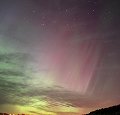
|
Mirko Harnisch,
Dunedin, Otago, New Zealand Aug. 25 |
#1, #2, #3, #4 |
The clouds parted just in time for this show. Southern Lights above, Southern Ocean below. Taken from Dunedin's St Kilda Beach on August 25, between 0.30 and 1.30 NZST. Canon EOS 300D, 800/1600 ASA, 10-20s exposure, f/3.5. |
|
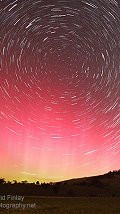
|
David Finlay,
Between Albion Park and Jamberoo, near Wollongong, NSW, Australia Aug. 24 |
#1, #2, more |
It's not often we get to see auroras here in Australia, so whenever a slim chance arrives I take it. I'm sure a lot of northern hemisphere people think it's nothing but light pollution, but to me it's GOLD! When you live at 34.4 degrees south any type of auroral activity is spectacular. This particular display lasted less than 20 minutes, and would you believe I missed seeing the best part of it! I was writing a short note to the farmers who's driveway I had parked in. Forunately I left the camera shooting away on it's own and it captured everything. When I finally looked up the whole southern horizon was glowing. Image details: Canon 1DmkII, composite of 156 images, 30 seconds, 17mm, f2.8. |
|
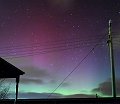
|
Robin Sharrock,
Warrnambool, Victoria, Australia Aug. 24 |
#1, more |
Nikon D100 digital camera.20mm nikkor lens set at f5.6 & 400iso.30 sec exp.Processd in Adobe photoshop 6 & Neat Image |
|
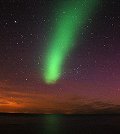
|
Arlo
Gingerich, Southwestern Ontario, Canada Aug. 24 |
#1, #2 | At first we thought that the 'long' one was light passing through the smoke from our beach-side campfire. It quickly became apparent that it wasn't! To the north were thin spires, but this green band, which extended the length of the sky, quickly formed and changed. Absolutely incredible! Nikon D70 (with horrible noise problems..) 800 ISO, about 2-3 minutes exposure for each. |
|
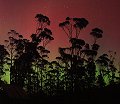
|
Paul Alting,
Lilydale, Northern Tasmania, Australia Aug. 24 |
#1, #2 |
Using Fuji S5500. Shutter speed of 15 seconds at F/2.8. This display lasted for about 3 to 4 hours, with various displays of colours and patterns. A fantasic night time light show! |
|
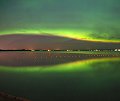
|
Gilles Boutin,
Municipal beach of St-Prime Quebec Canada Aug. 24 |
#1, #2, #3, #4, more |
The clouds were the king of the Quebec center, a parcours of a 300 km was necessary to capture a wonderful aurora. Lac St-Jean water were the witness of this phénomene. August 24 2005 21h30 o`clock at St-Prime town Quebec. Pentax ist ds, is a new arm for Gilles Boutin chasseur d`aurore boreale |
|
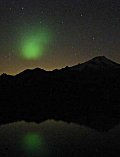
|
Wade B Clark Jr,
Baker Lake, Washington State, USA Aug. 24 |
#1, |
After missing the events of last night, I went out to try and capture the northern lights with my camera. The only display was one green patch that would fade and brighten for about 5 minutes starting at about 10:15pm PDT...it then disappeared for the evening. This photo shows the patch over Mt Baker and Baker Lake. |
|
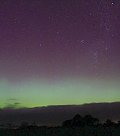
|
Richard Pollard,
Tooradin, 60Km south east of Melbourne, Victoria Australia Aug. 24 |
#1, #2 |
Aurora Australis (yes, the other one!) seen as a whitish glow with the naked eye but much improved after imaging with a Sony DSC-W1 digital camera, 400 ASA, 30 secs at 2.8 |
|
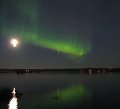
|
Justin Paulson,
Yellowknife, NWT, Canada Oct. 25 |
#1, #2 |
Over Yellowknife at 11pm to 12 midnight. Photos taken on a Canon Powershot digital camera, 2-8 sec. exposures. |
|
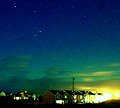
|
Conor
McDonald, Northern Ireland Aug. 25 |
#1 |
Beam appeared about 50deg high and stayed for about 10mins, then is vanaished and an arc appeared for about 40mins |
more images: from Laurence Harry of Nanaimo, British Columbia, Canada;
|

